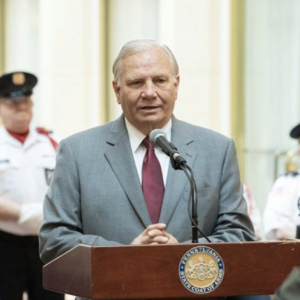“We’re talking about people’s jobs, people’s money, people’s livelihoods.”
That’s the response from state Sen. Bob Mensch (Berks, Bucks, and Montgomery) to Gov. Tom Wolf’s decision to end-run the General Assembly and push Pennsylvania into the Regional Greenhouse Gas Initiative (RGGI).
RGGI is a cooperative, market-based effort among Connecticut, Delaware, Maine, Maryland, Massachusetts, New Hampshire, New Jersey, New York, Rhode Island, Vermont, and Virginia to cap and reduce CO2 emissions from the power sector. It represents the first cap-and-invest regional initiative implemented in the United States.
States sell nearly all CO2 allowances through auctions and invest proceeds in energy efficiency, renewable energy, and other consumer benefit programs. The costs of those allowances are felt in consumers’ energy bills.
On September 1, Pennsylvania’s Independent Regulatory Review Commission (IRRC) voted to approve Regulation 3274 Environmental Quality Board #7-559: CO2 Budget Trading Program, paving the way for Pennsylvania to join RGGI. The vote was 3-2.
“You need the legislature to participate with the governor in this,” said Mensch.
Wolf has repeatedly stated Pennsylvania needs to be part of RGGI to curb emissions and combat man-made climate change.
“Climate change is one of the most critical issues we face and I have made it a priority to address ways to reduce greenhouse gas emissions,” Wolf said on the day of the vote. “By participating in RGGI, Pennsylvania is taking a historic, proactive, and progressive approach that will have significant positive environmental, public health, and economic impacts.”
In 2019, Wolf issued an executive order for the Pennsylvania Department of Environmental Protection (DEP) to join RGGI.
“He wants to set himself out there as a king,” said Mensch. “This governor is a socialist and he’s got to be reined in. I think IRRC did the people of Pennsylvania a great injustice.”
Other Republican legislators have also criticized the governor for his actions, including state Sen. Joe Pittman (R-Armstrong, Butler, Indiana, and Westmoreland).
“Neither the governor nor any member of his administration even bothered to come to my district over the past 22 months to talk about RGGI and how working families would benefit from the closure of power plants and the elimination of jobs.”
“Make no mistake, the governor, the Environmental Quality Board (EQB) and now IRRC are fully complicit in assaulting the Constitution, the law, and the people of Pennsylvania,” said House Environmental Resources and Energy Committee (ERE) Majority Chairman Daryl Metcalfe (R-Butler) following IRRC’s vote.
The reference to the EQB involves its 13-6 vote in August to move forward with Wolf’s plan for Pennsylvania to join RGGI, part of his efforts to avoid legislative approval.
Pennsylvania Manufacturers’ Association criticized that move, saying EQB tossed aside “the objections of business, organized labor, and consumer groups.”
And the pro-jobs organization Pittsburgh Works Together warns entering RGGI will hurt the state’s competitiveness by sending electric rates higher.
“Pennsylvania has some of the most inexpensive electricity in this part of the country, but that could change if the state joins the Regional Greenhouse Gas Initiative,” they write, noting the four states with the highest electric rates are all in RGGI, as are eight of the top 10.
“The only RGGI state that has lower electricity prices is Virginia – which joined RGGI in 2020 and has been subject to the group’s penalty for producing electricity with fossil fuel for less than a year.”
Looking forward, Mensch said there is some consideration on how to proceed with new legislation.
“It would likely face a veto from the governor, so it’s going to depend on how much legislative support we get for that whether or not we could do a veto override,” said Mensch. “We have to watch everybody’s votes.”
Mensch, whose previous work experience includes time served as Marlborough Township supervisor, a period in which he led successful land-preservation efforts, said he is not anti-environment.
“I want the legislature, the representatives for the people, involved in this process,” said Mensch. “We’re talking about people’s lives, their livelihood, and it’s ridiculous that one man, one person thinks that he should have power to control all that.”
By his count, Mensch said there are approximately 30 environmental compacts in which the legislature is a partner with the governor.
“With RGGI, the argument is it’s environmental and the legislature should not be involved in that according to the governor,” said Mensch. “I think it’s way too much power placed in the hands of the governor because you have one person who will have control over the pricing of energy, the placement of jobs, and that is way too much-concentrated power.”

